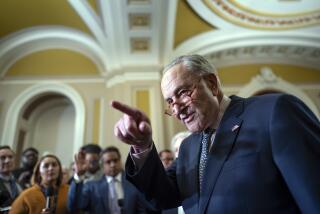Bush, GOP Senators Seek Strategy on Bolton
- Share via
WASHINGTON — President Bush urged Republican senators Tuesday to work harder to win confirmation of John R. Bolton as U.N. ambassador, even as Republicans looked to the White House to break the impasse with Democrats.
Senate Majority Leader Bill Frist (R-Tenn.) indicated that the president was not yet prepared to use his powers to appoint Bolton to the job when Congress is in recess in early July -- a move Democrats would consider provocative and international partners might interpret as casting a pall over Bolton’s position.
A recess appointment “was not discussed,” Frist said as he left the White House after Republican senators met with Bush over lunch. “Basically our goal is an up-or-down vote, so we’re continuing to work on that.”
Frist added that Bush expressed no willingness to meet Democratic demands for two sets of documents related to Bolton’s work as undersecretary of State for arms control and international security in the president’s first term.
Two attempts to bring Bolton’s nomination to a vote have failed, with Frist unable to muster the 60 votes he needs to end debate on the issue -- the final step before a confirmation vote is taken.
Ominously for the majority party, one Republican defected during the second attempt Monday night, when Sen. George V. Voinovich of Ohio, a critic of Bolton, joined Democrats in voting against limiting debate on the nomination.
Democrats have insisted they have a right to review the documents they have requested from the White House, and have promised to continue to block a vote until the White House relents.
One of the most hawkish members of the Bush administration, Bolton repeatedly stirred controversy while at the State Department.
Some former employees have accused him of interpreting intelligence to suit his ideological beliefs, and of berating subordinates whom he considered insufficiently responsive to his demands. Democrats say the documents they are seeking would shed light on both of those accusations.
The president and Senate Republicans appeared to be looking to the other to break the stalemate with Democrats.
“Whether or not we bring it back to the floor depends on really what the president’s conversations with the Democrats are,” Frist told an Associated Press reporter before the lunch, according to a transcript provided by Frist’s office. “It’s really up to the president.”
Frist said he had exhausted his own efforts to mediate between the White House and Senate Democrats.
Democrats and Republicans expressed doubt that there was any point in Frist scheduling another vote.
“It keeps turning out the same. He keeps losing ground,” said Senate Minority Leader Harry Reid (D-Nev.).
“The president is very clear that he wants an up-or-down vote,” said Sen. John McCain (R-Ariz.), but he added that the question of scheduling a third vote “depends on whether we make progress or not” in winning over a few more Democrats.
One Democrat targeted by the GOP as a potential switch vote, Sen. Dianne Feinstein of California, said Republicans were wasting their time trying to get more Democrats to break ranks.
“The question is very simple: Provide the information,” Feinstein said. “If this were a Clinton nominee, and the shoe were on the other foot, Republicans would hang tough until they got the information.”
Republicans accused Democrats of shifting their demands, a charge Democrats deny.
“The Democrats continually are changing the goal posts. It is clear their object is to obstruct,” White House Deputy Chief of Staff Karl Rove told CNN.
He indicated that Bush was holding out for a full confirmation and was not yet prepared to make a recess appointment.
Under the Constitution, presidents are allowed to make some appointments without Senate confirmation if Congress is in recess. Originally designed to keep the government functioning during long recesses when travel was difficult, presidents have used the power to gain temporary appointments without confirmation.
If Bush were to make such an appointment, Bolton could serve as U.N. ambassador until the end of the current congressional session in 2006.
Accounts of the White House meeting differed widely. One Republican described it as “pep rally,” a second as “not a pep rally,” and a third as a forum for “candid questions.” After the meeting, Republicans expressed frustration with what they considered limited options.
“At this point in time, I’m not prepared to sign on to what course of action to take,” said Sen. John W. Warner (R-Va.). “I can’t predict the future, and I have no comment on a recess appointment.”
Times staff writers Edwin Chen, Mary Curtius and Janet Hook contributed to this report.
More to Read
Get the L.A. Times Politics newsletter
Deeply reported insights into legislation, politics and policy from Sacramento, Washington and beyond. In your inbox twice per week.
You may occasionally receive promotional content from the Los Angeles Times.










